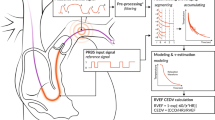Abstract
As the incidence of heart failure increases, an organ shortage for cardiac transplant worsens. There has been development of both short and long-term mechanical circulatory devices for this population, each with unique advantages and different adverse event profiles. The long-term devices provide excellent mechanical circulatory support but are associated with significant morbidity. The intravascular ventricular assist system (iVAS) is a minimally invasive, ambulatory, counterpulsation heart assist system developed to provide long-term support for patients with advanced heart failure while avoiding the surgical trauma of a left ventricular assist device and minimizing the risks of infection and hemocompatibility-related adverse events. Initial experience with the iVAS shows promising evidence for its use as a long-term mechanical circulatory support device.

Similar content being viewed by others
References
Benjamin EJ, Virani SS, Callaway CW, et al. Heart disease and stroke statistics-2018 update: a report from the American Heart Association. Circulation. 2018;137:e67–e492.
Kirklin JK, Pagani FD, Kormos RL, et al. Eighth annual INTERMACS report: Special focus on framing the impact of adverse events. J Heart Lung Transplant. 2017;36:1080–6.
Mehra MR. The burden of haemocompatibility with left ventricular assist systems: a complex weave. Eur Heart J. 2019;40:673–7.
Pagani FD, Aaronson KD, Kormos R, et al. The NHLBI REVIVE-IT study: Understanding its discontinuation in the context of current left ventricular assist device therapy. J Heart Lung Transplant. 2016;35:1277–83.
Starling RC, Estep JD, Horstmanshof DA, et al. Risk assessment and comparative effectiveness of left ventricular assist device and medical management in ambulatory heart failure patients: The ROADMAP Study 2-Year Results. JACC Heart Fail. 2017;5:518–27.
Webb CA, Weyker PD, Flynn BC. Management of intra-aortic balloon pumps. Semin Cardiothorac Vasc Anesth. 2015;19:106–21.
Fried JA, Nair A, Takeda K, et al. Clinical and hemodynamic effects of intra-aortic balloon pump therapy in chronic heart failure patients with cardiogenic shock. J Heart Lung Transplant. 2018;37:1313–21.
Tanaka A, Tuladhar SM, Onsager D, et al. The subclavian intraaortic balloon pump: A compelling bridge device for advanced heart failure. Ann Thorac Surg. 2015;100:2151–7.
Solanki P. Aortic counterpulsation: C-pulse and other devices for cardiac support. J Cardiovasc Transl Res. 2014;7:292–300.
Jeevanandam V, Song T, Onsager D, et al. The first-in-human experience with a minimally invasive, ambulatory, counterpulsation heart assist system for advanced congestive heart failure. J. Heart Lung Transplant. 2018;37:1–6.
Funding
No funding was required as this is a review article and not a publication of primary data.
Author information
Authors and Affiliations
Corresponding author
Ethics declarations
Ethical
This article is a review of previously published work and of clinical experience and is not the publication of primary data. The article provides opinions based on this experience. The article complies with the ethical responsibilities outlined by the journal.
Human and animal rights
This article is a review article and not a publication of primary data. For the research discussed, all procedures performed in studies involving human participants were in accordance with the ethical standards of the institutional and/or national research committee (include name of committee + reference number) and with the 1964 Helsinki declaration and its later amendments or comparable ethical standards. There were no animals included in these studies.
Informed consent
This article is a review article and not a publication of primary data. For the research discussed, informed consent was obtained from all individual participants included in the studies.
Conflict of interest
Trever Symalla has no conflicts of interest. Valluvan Jeevanadam is a consultant for Abbott.
Additional information
Publisher’s note
Springer Nature remains neutral with regard to jurisdictional claims in published maps and institutional affiliations.
Rights and permissions
About this article
Cite this article
Symalla, T., Jeevanandam, V. An ambulatory counterpulsation system—a potential option for extended mechanical support. Indian J Thorac Cardiovasc Surg 36 (Suppl 2), 275–278 (2020). https://doi.org/10.1007/s12055-019-00887-y
Received:
Revised:
Accepted:
Published:
Issue Date:
DOI: https://doi.org/10.1007/s12055-019-00887-y




